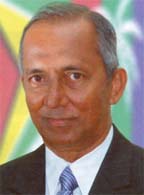Government paid the New Guyana Pharmaceutical Company Inc. (GPC) over $300 million last month to secure drugs for the health sector, based on awards granted through an international open tender and on a Procurement Board approved-selective tender process, Health Minister Dr Leslie Ramsammy has disclosed.

The Minister made this disclosure on Monday as the National Assembly was debating government’s move to pass a bill supporting more than $8 billion in additional provisions for the period December 8-December 31, 2009. He was at the time accounting at the request of the opposition MPs how the additional $433,992,352 that was spent for the procurement of drugs and medical supplies had been used. He was also asked to account for the additional $40 million that was spent by the Georgetown Public Hospital Corporation (GPHC) for the same purpose.
In recent years Govern-ment transactions with the New GPC Inc. have come under great scrutiny especially after a recent Auditor General’s report noted that the government was giving preferential treatment to the company.
Asked by AFC Chairman Khemraj Ramjattan to name the companies to which the monies were advanced to and on what tender board process, Dr Ramsammy said that money was paid to the Pan American Health Organi-zation (PAHO) through selective tendering approved by the National tender board, to which Cabinet had no objection and to the New GPC Inc., under open international as well as selective tender processes. PAHO was also paid more funds under contracts awarded under selective tendering, the Minister disclosed.

Asked as to how much money was paid to the New GPC Inc., $200 million was paid to them under the selective tender process and on $100 million under the international public tender.
Further quizzed as to exactly when the money was paid and for what purpose, Ramsammy told the National Assembly that the money was paid between December 28 and 31. He said that it was to procure drugs to last up to April 2010. According to him, the drugs were ordered in November and payments were made to the companies in the December during the identified period.
PNCR-1G MP Winston Murray, Shadow Finance Minister, queried when it came to an open international tender being applied to contract awarded to the New GPC Inc. whether other agencies had made bids. The Health Minister replied in the affirmative, and Murray asked for the names of the other bidders to be provided to the National Assembly. Ramsammy said he would provide this information at the next sitting of the House.
Meanwhile, the Health Minister was also grilled about the $40 million that was advanced to the GPHC from the Contingencies Fund to pay for the procurement of drugs and medical supplies. Originally $1 billion had been budgeted for this cause.
When Murray asked whether in paying out the $40 million if the process utilised was that of an open tender procedure, Ramsammy said that both the open and selected tender process was applied and money was paid to several suppliers, including the New GPC Inc. According to the Minister the selected tenders that were approved, were not objected to by Cabinet.
Asked by Murray if he was aware that Cabinet does not have any authority to override the Procurement law with by stating its “no objection to” a selected tender, Ramsammy said that whenever special tender was given to the disbursement of these funds it was given with the approval of the National Tender Board.
During the 2009 Budget debate, Murray had clashed with the Health Minister after it was revealed that millions of dollars were paid to the New GPC for the supply of drugs without proper procedures of procurement.
On Monday, Murray noted that during the budget debate, he had requested copies of a letter from National Procurement and Tender Board, which granted the Ministry a waiver to purchase directly from the New GPC. He said, however, that this letter was never supplied to him.
Dr Ramsammy retorted by saying he had supplied the document to the Public Accounts Committee of the National Assembly. Murray, however, argued that this action could not be equated with providing the document to him. After a constant back and forth between the two, Ramsammy agreed to send the letter.
The Auditor General’s 2006 report (released in 2008) showed preferential treatment given to the New GPC, while highlighting discrepancies such as 12 contracts being entered into with the Georgetown Public Hospital (GPHC) that showed no evidence of tender board procedures being adhered to.
For 2006, the report pointed out that amounts totalling $608M were spent by GPHC on drugs and medical supplies but that it could not completely account for these purchases since there was no central point of accountability. The response of the GPHC, according to the report, was that the corporation had no control over the Materials Management Unit staff since they came directly under the Ministry of Health. The audit office report then pointed out that contracts worth $430M were entered into with NGPC but added that there was “no evidence to indicate that tender board procedures were adhered to.” Questions had been raised about this in the light of the deal between the government and NGPC’s parent company, QA11, for the divestment of the Sanata Textiles site and also the controversial concessions that were announced for the group and which were not catered for by law.




